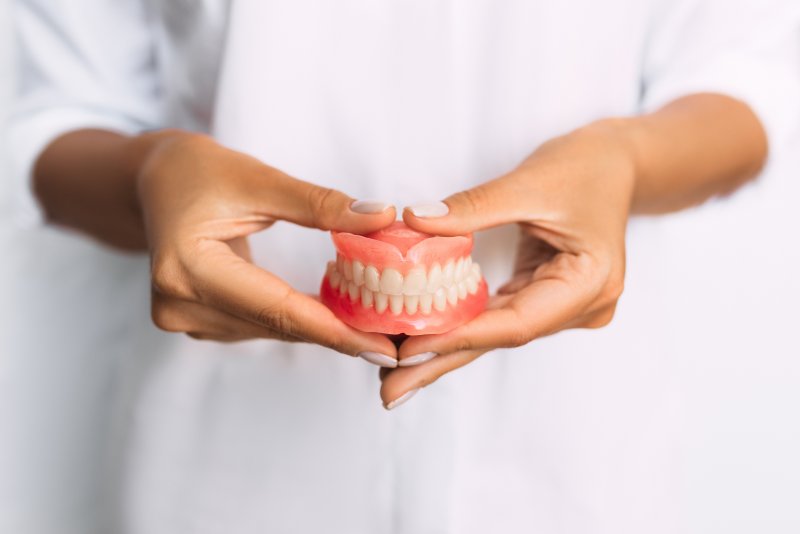
Many people deal with the oral and overall health complications that come with extensive tooth loss. Fortunately, dentures have allowed millions of patients to achieve beautiful complete smiles. These prosthetic dental appliances are so lifelike that strangers won’t be able to tell that they are not real and so comfortable that patients often forget that they are there. However, it can take a while to adjust to wearing them. Here’s a quick guide to what you can expect during your first month with dentures along with a few tips for making the transition easier.
The First Day
Your experience immediately after receiving dentures depends on a variety of factors. If you need tooth extractions before receiving dentures, you can expect to receive pain relievers and antibiotics to prevent discomfort and infection while the wounds heal, and it’s important not to remove your dentures during the first twenty-four hours afterward. This is likely to be the only time your dentist will recommend wearing your dentures to bed, as they will act as a pressure bandage for your healing gums.
During this period, it’s best to stick to soft foods like macaroni and cheese or mashed potatoes to avoid stressing your gums. After the first twenty-four hours, you should begin removing and soaking your dentures before going to bed.
The First Two Weeks
One day after tooth extraction, you’ll need to return to your dentist’s office so they can remove your dentures. While adjusting to your new appliance, you can expect to develop sore areas on your gums and may produce more saliva than usual. Since the gum tissue will contract as it heals, you may also need to go back to the office to have your dentures adjusted. If you still experience discomfort while eating, you may want to supplement meals with a protein-rich beverage.
The First Month
After a few weeks have passed, your mouth should be more adjusted to wearing dentures, meaning that you shouldn’t have as many sore spots or as much saliva flow. However, you may still be getting used to speaking and eating with dentures at this point. If you find that you are still lisping when you talk, try reading a favorite book out loud and repeating any words that give you trouble. Your lisp should diminish with practice, but don’t be afraid to call your dentist if you need any adjustments.
Dentures can be a fantastic way to replace lost teeth. Consulting with your dentist can help determine if you are a good candidate for this appliance.
About the Author
Dr. Marc Moulton earned his dental degree at the University of Alabama at Birmingham School of Dentistry and completed a one-year residency program at the Veterans Administration Hospital. He is proud to be a member of the American Dental Association and the American Academy of Cosmetic Dentistry. His office in Hoover, AL, offers general, restorative, cosmetic, and emergency dentistry such as denture services. To schedule a consultation for dentures, contact his office online or dial (205) 988-3360.
